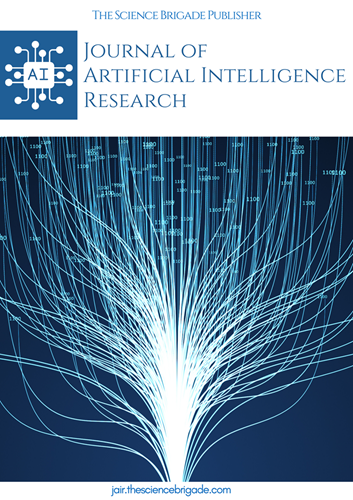Utilizing Foundation Models and Reinforcement Learning for Intelligent Robotics: Enhancing Autonomous Task Performance in Dynamic Environments
Keywords:
foundation models, reinforcement learning, intelligent roboticsAbstract
The burgeoning field of intelligent robotics demands the development of agile and versatile agents that can effectively navigate and operate within dynamic and complex environments. This paper delves into the synergistic integration of foundation models (FMs) and reinforcement learning (RL) to achieve superior autonomous task performance for robots. FMs, pre-trained on massive datasets encompassing diverse modalities, exhibit exceptional capabilities in areas such as perception, language understanding, and world modeling. By capitalizing on these strengths, we explore how FMs can be leveraged to augment the decision-making processes employed within RL frameworks. This research posits that the amalgamation of FMs and RL can empower robots with several key advantages:
Enhanced Situational Awareness: FMs facilitate the fusion of visual and language cues, leading to a more comprehensive understanding of the robot's surroundings. This enriched perception enables robots to make informed decisions and react more effectively to dynamic changes in the environment.
Improved Task Planning: By incorporating commonsense reasoning gleaned from FMs, robots can achieve superior task planning capabilities. FMs encode a vast amount of world knowledge, allowing robots to reason about cause-and-effect relationships, object affordances, and environmental constraints. This knowledge informs the selection of appropriate actions and facilitates the formulation of more robust plans.
Efficient Adaptation to Unforeseen Circumstances: RL's core strength lies in its ability to learn through trial and error, enabling robots to adapt their behaviors in response to unforeseen situations. The integration of FMs with RL can potentially enhance this capability. By providing robots with a richer understanding of the environment and the task at hand, FMs can guide exploration strategies within the RL framework, leading to faster convergence on optimal policies for novel scenarios.
This paper presents a comprehensive review of the cutting-edge advancements in the integration of FMs and RL for intelligent robotics. We then delve into the theoretical underpinnings of this combined approach, outlining the potential benefits and challenges associated with its implementation. Finally, we discuss promising future research directions that capitalize on the burgeoning potential of FMs and RL to achieve unprecedented levels of autonomous robot performance in dynamic environments.
References
Amodei, Dario, et al. "Concrete problems in AI safety." arXiv preprint arXiv:1606.06565 (2016).
Bommasani, Reif, et al. "On the Opportunities and Risks of Foundation Models." arXiv preprint arXiv:2108.00272 (2021).
Tatineni, Sumanth. "Ethical Considerations in AI and Data Science: Bias, Fairness, and Accountability." International Journal of Information Technology and Management Information Systems (IJITMIS) 10.1 (2019): 11-21.
Chen, Mick, et al. "Evaluating Large Language Models on Reasoning." arXiv preprint arXiv:2201.11855 (2022).
Devlin, Jacob, et al. "BERT: Pre-training of Deep Bidirectional Transformers for Language Understanding." arXiv preprint arXiv:1810.04805 (2018).
He, Karl, et al. "Masked Autoregression for Efficient Pretraining of Text Summarization Models." arXiv preprint arXiv:1906.08107 (2019).
[Hendricks, Lisa Anne, et al. "Localizing Referring Expressions in Complex Scenes." 2016 IEEE Conference on Computer Vision and Pattern Recognition (CVPR) (pp. 4129-4137). Institute of Electrical and Electronics Engineers (IEEE). (https://www.ncbi.nlm.nih.gov/pmc/articles/PMC2586758/)]
Johnson, Justin, et al. "CLEVR: A Dataset for Fine-Grained Reasoning and Knowledge Representation." arXiv preprint arXiv:1612.06890 (2016).
Nichol, Alec, et al. "Gym: A Toolkit for Reinforcement Learning." arXiv preprint arXiv:1812.01729 (2018).
[Radford, Alec, et al. "Improving Language Understanding by Generative Pre-Training." (2018). (https://arxiv.org/pdf/2012.11747)]
Vaswani, Ashish, et al. "Attention is All You Need." arXiv preprint arXiv:1706.03762 (2017).
[Arjovsky, Martin, et al. "Principles of Deep Learning." (2019). (https://mitpress.mit.edu/9780262035613/deep-learning/)]
Baxter, Joshua, and Peter L. Bartlett. "Infinite-horizon policy gradient estimation." Journal of Machine Learning Research 15.1 (2014): 1509-1531.
Lillicrap, Timothy P., et al. "Continuous control with deep reinforcement learning." arXiv preprint arXiv:1502.01783 (2015).
Mnih, Volodymyr, et al. "Playing games with deep reinforcement learning." arXiv preprint arXiv:1312.5602 (2013).
Mnih, Volodymyr, et al. "Human-level control in a complex real-world environment." Nature 518.7540 (2015): 565-568.
Peters, Jan, et al. "Deep reinforcement learning for robotics." arXiv preprint arXiv:1701.07271 (2017).
Downloads
Published
How to Cite
Issue
Section
License

This work is licensed under a Creative Commons Attribution-NonCommercial-ShareAlike 4.0 International License.
License Terms
Ownership and Licensing:
Authors of this research paper submitted to the journal owned and operated by The Science Brigade Group retain the copyright of their work while granting the journal certain rights. Authors maintain ownership of the copyright and have granted the journal a right of first publication. Simultaneously, authors agreed to license their research papers under the Creative Commons Attribution-NonCommercial-ShareAlike 4.0 International (CC BY-NC-SA 4.0) License.
License Permissions:
Under the CC BY-NC-SA 4.0 License, others are permitted to share and adapt the work, as long as proper attribution is given to the authors and acknowledgement is made of the initial publication in the Journal. This license allows for the broad dissemination and utilization of research papers.
Additional Distribution Arrangements:
Authors are free to enter into separate contractual arrangements for the non-exclusive distribution of the journal's published version of the work. This may include posting the work to institutional repositories, publishing it in journals or books, or other forms of dissemination. In such cases, authors are requested to acknowledge the initial publication of the work in this Journal.
Online Posting:
Authors are encouraged to share their work online, including in institutional repositories, disciplinary repositories, or on their personal websites. This permission applies both prior to and during the submission process to the Journal. Online sharing enhances the visibility and accessibility of the research papers.
Responsibility and Liability:
Authors are responsible for ensuring that their research papers do not infringe upon the copyright, privacy, or other rights of any third party. The Science Brigade Publishers disclaim any liability or responsibility for any copyright infringement or violation of third-party rights in the research papers.




